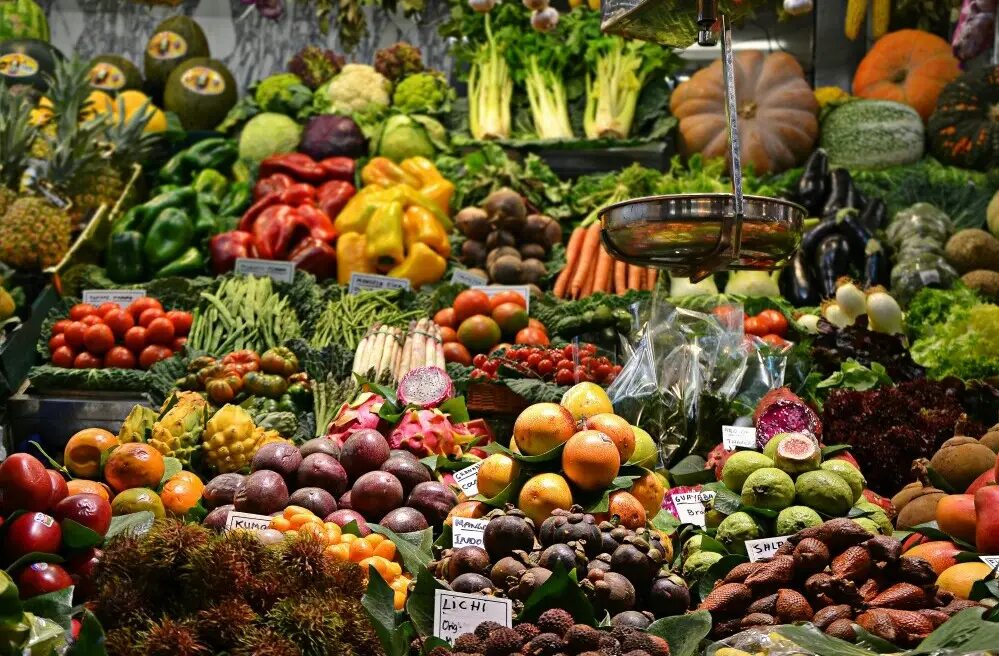Saving Green with a Plant based Diet

Transitioning approach to a plant-based diet not only benefits your health but can also save you money in the long run.
Plant-based foods are often more affordable than animal products, and with careful planning and savvy shopping. You can significantly reduce your grocery bill while enjoying nutritious and delicious meals.
In this post, we’ll explore various plant-based foods that are budget-friendly and provide tips on how to incorporate them into your diet without breaking the bank.
Budget-Friendly Staples
When it comes to plant-based diet on a budget, stocking up on affordable staples is key.
Legumes, such as beans, lentils, and chickpeas, are superfoods which are excellent sources of protein and fiber and can be purchased in bulk at a fraction of the cost of meat. Similarly, grains like rice, quinoa, and oats are versatile and filling options that won’t strain your wallet.
Tip: Buying dried beans and grains in bulk and cooking them at home can save you even more money compared to pre-packaged and processed options.
Seasonal Fruits and Vegetables
Opting for seasonal produce is not only sustainable practice but also more economical.
Seasonal fruits and vegetables are often abundant and therefore cheaper than their out-of-season counterparts. Additionally, buying locally grown produce can further reduce costs by eliminating the expenses associated with long-distance transportation.
Tip: Explore farmers’ markets or join a community-supported agriculture (CSA) program to access fresh, seasonal produce at affordable prices while supporting local growers.

Frozen and Canned Options
Frozen and canned fruits and vegetables are convenient alternatives to fresh produce and can be significantly cheaper, especially when certain items are out of season.
These products are typically harvested and processed at their peak ripeness, preserving their nutritional value. Additionally, they have a longer shelf life, reducing the likelihood of food waste.
Tip: Look for frozen or canned fruits and vegetables with no added sugars or sodium to maximize their health benefits.
Plant-Based Proteins
Incorporating plant-based protein sources into your meals can be cost-effective compared to meat and dairy products.
Tofu and tempeh are affordable sources of protein that can be used as substitutes in a variety of recipes. Likewise, nuts, seeds, and nut butters are nutrient-dense options that can add flavor and texture to dishes without breaking the bank.
Tip: Experiment with different plant-based protein sources to find affordable options that suit your taste preferences and dietary needs.
Meal Planning and Batch Cooking
Meal planning and batch cooking are invaluable strategies for saving both time and money on a plant-based diet. By planning your meals in advance and preparing large batches of food, you can minimize waste. Ensuring that you have nutritious options readily available throughout the week.
Additionally, cooking at home allows you to control the ingredients and portion sizes, further optimizing your budget.
Tip: Schedule a weekly meal planning session and designate a day for batch cooking to streamline your food preparation process and maximize efficiency.
Creative Cooking Techniques
Getting creative in the kitchen can help you make the most of affordable plant-based ingredients. Repurposing leftovers, incorporating inexpensive staples like beans and grains into multiple dishes, and experimenting with different flavor profiles and cooking techniques can breathe new life into budget-friendly meals.
Tip: Explore online resources, such as budget-friendly plant-based recipe blogs and cookbooks, for inspiration and ideas on how to create delicious meals without breaking the bank.
Here is a direct link to our Recipe Index – Plantaful Life

DIY Alternatives
For those who enjoy a hands-on approach to cooking, making your own plant-based alternatives to common pantry staples can be both rewarding and economical.
For example, you can easily prepare homemade plant-based milk using ingredients like oats, almonds, or soybeans at a fraction of the cost of store-bought options.
Similarly, DIY alternatives to items like granola bars, salad dressings, and no bake energy bites, can help save money while allowing you to customize flavors and ingredients to suit your preferences.
Tip: Invest in basic kitchen equipment, such as a blender or food processor, to make DIY alternatives more accessible and efficient.
Education and Awareness
Finally, investing in education and increasing awareness about plant-based eating can empower individuals to make informed choices that align with their budgetary constraints.
By learning about the nutritional benefits of different plant-based foods and how to incorporate them into balanced meals, individuals can optimize their grocery spending while prioritizing their health and well-being.
Additionally, understanding the health and ethical implications of food choices can further motivate individuals to embrace plant-based eating as a long-term lifestyle.
Tip: Take advantage of our free online resources, seek out educational websites, podcasts, and documentaries, to deepen your understanding of plant-based nutrition and its associated benefits.

Real-Life Examples of Saving Money on a Plant Based Diet
Check out how lots of folks have managed to save serious cash by switching to plant-based meals. Many families and individuals we know have made the shift, cutting down their grocery bills over time.
Bulk Buying and Meal Prepping:
Sarah, a working mother of two, saves money by purchasing dried beans, lentils, rice, and other grains in bulk from a local wholesale store. She spends a Sunday afternoon cooking large batches of beans and grains, which she then incorporates into various meals throughout the week.
By planning her meals in advance and batch cooking, Sarah avoids the temptation to dine out or order takeout, resulting in substantial savings on her monthly grocery bill.
Seasonal and Local Produce:
Jonii, a college student on a tight budget, shops at his local farmers’ market for seasonal fruits and vegetables. He takes advantage of discounted prices on items like fruit, carrots, and leafy greens, which are abundant during the school year.
By purchasing locally grown produce in-season, he not only saves money but also supports local farmers and reduces the stress of grocery shopping.
DIY Plant-Based Alternatives:
Emily, a recent graduate living in a high-cost urban area, makes her own plant-based milk at home using oats and water. She purchases oats in bulk and uses a simple blender to create creamy oat milk, which she uses in her morning coffee and green smoothie.
By making her own plant-based milk instead of buying expensive store-bought options, Emily saves money while enjoying a sustainable and customizable alternative.
Utilizing Frozen and Canned Foods:
Mike, a single professional with a busy schedule, relies on frozen vegetables and canned beans to streamline his meal preparation. He purchases frozen mixed vegetables and canned chickpeas, black beans, and tomatoes.
He incorporates into quick and easy stir-fries, soups, and chili. By stocking up on affordable frozen and canned options, Mike avoids food waste and saves both time and money on his weekly grocery shopping.
Community Resources and Sharing Initiatives:
The Martinez family participates in a community garden program where they grow their own fruits and vegetables during the spring and summer months.
In exchange for their time and labor, they receive a share of the harvest, including fresh produce like tomatoes, peppers, and squash.
By participating in the community garden program, the Martinez family reduces their grocery expenses while connecting with neighbors and fostering a sense of community.
Real World Examples Recap
These real-world examples demonstrate that saving money on a plant-based diet is achievable through practical strategies.
Bulk buying, meal prepping, utilizing seasonal and local produce, making DIY alternatives, incorporating frozen and canned foods, and engaging with community resources.
By adopting these cost-effective approaches to plant-based eating, individuals and families can enjoy nutritious and delicious meals while staying within their budget constraints.
When comparing the cost of plant-based foods to animal-based foods, there are several factors to consider that contribute to the cost-saving potential of a plant-based lifestyle.
Closing Thoughts
In conclusion, adopting a plant-based diet can be a cost-effective and sustainable way to nourish your body while minimizing your environmental footprint.
By prioritizing budget-friendly staples, utilizing convenience foods and DIY alternatives, engaging with community resources, and investing in education and awareness, individuals can enjoy the numerous benefits of plant-based eating without breaking the bank.
Whether you’re motivated by health, environmental, or economic concerns, embracing plant-based foods offers a win-win solution.
Start small, experiment with different ingredients and recipes, and discover the countless benefits of plant-based eating for both your wallet and your well-being.
Please leave us a comment if you are looking for support on your wellness journey or contact us directly if you have any questions.
Subscribe now to get a user-friendly “Get Started” guide featuring 12 tips for transitioning to a WFPB diet.
Cheers,
Plantaful Life Team
Disclaimer: The information shared in this blog post and on our website is for educational and informational purposes only. We are here to inspire and support you on your plant-based journey. However, always prioritize your health and consult with your trusted healthcare provider for personalized advice. By using our website, you acknowledge and agree that you have read and understood this medical disclaimer. Additionally, you acknowledge the significance of seeking professional medical advice for your specific health needs.
References:
Myths About Plant-Based Lifestyle – Plantaful Life
What You Should Know About Plant-Based Diets (clevelandclinic.org)